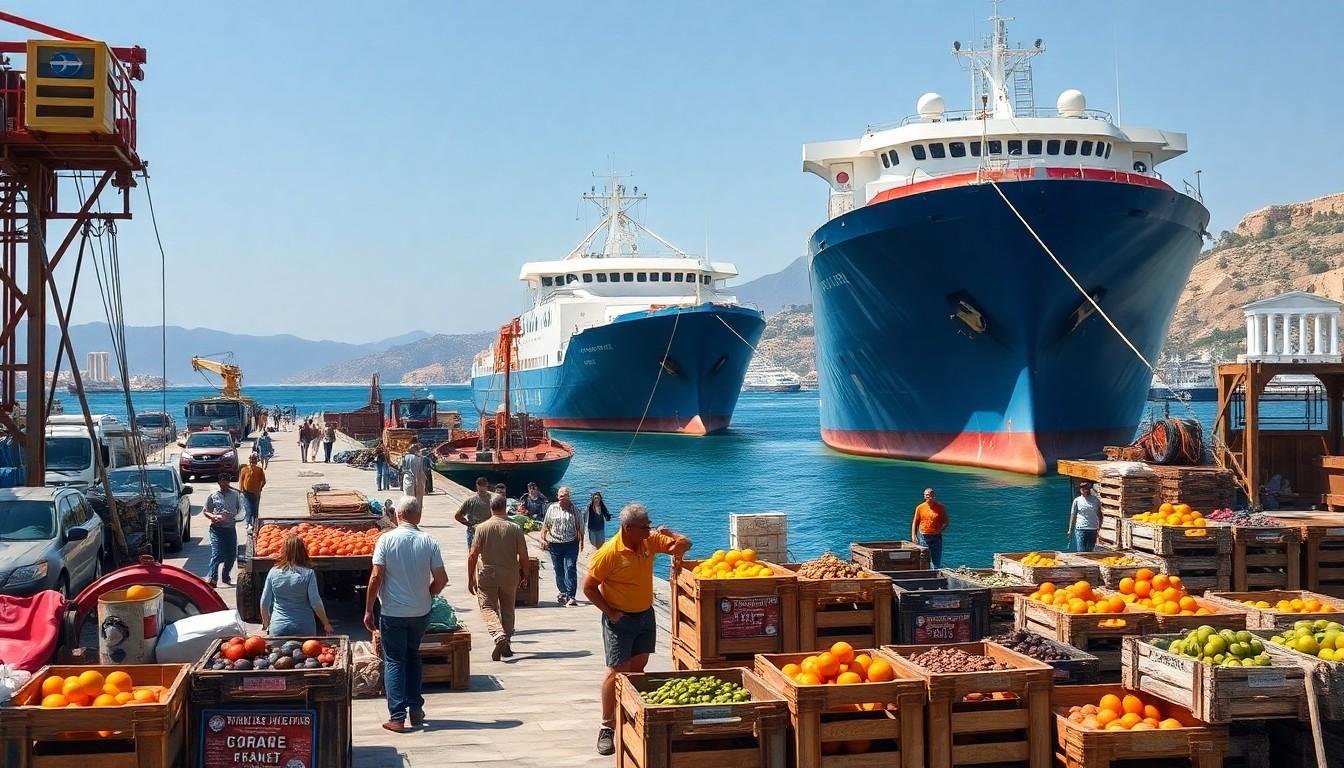Table of Contents
ToggleGreece, the land of sun-soaked beaches and mouthwatering moussaka, is more than just a tourist paradise. It’s a bustling hub of trade, where the ancient meets the modern in a delightful dance of imports and exports. Ever wondered what keeps this Mediterranean gem thriving? It’s not just the ouzo and olive oil!
Overview of Greece’s Trade
Greece’s trade encompasses various sectors, significantly impacting its economy. The country primarily exports goods such as machinery, pharmaceuticals, and agricultural products. In 2022, exports reached approximately €42 billion, demonstrating a robust trading capability.
Imports play an essential role in Greece’s market as well. Key import categories include crude oil, machinery, and vehicles. In 2022, Greece’s imports totaled around €60 billion, reflecting the nation’s reliance on foreign goods.
Agriculture remains a critical aspect of Greece’s exports. Olive oil and wine are among the most notable products, with Greece being one of the world’s largest producers. The food sector showcases the country’s rich agricultural traditions, adding value to its trade portfolio.
Manufactured products also contribute significantly to trade. The pharmaceutical industry has grown, with exports increasing steadily over the years. This sector showcases Greece’s innovation and commitment to quality.
Tourism often intersects with trade, driving demand for local products. Many visitors seek authentic Greek goods, further enhancing export opportunities. The influx of tourists supports both the economy and the export market.
Greece’s membership in the Eurozone facilitates trade within the European Union. The country benefits from access to a vast market, ensuring competitive pricing and improved trade relations. Tariff reductions and trade agreements help Greece expand its reach beyond Europe.
Investments in infrastructure continue to boost trade efficiency. Ports and logistics systems have seen substantial upgrades, enabling quicker shipments. Enhanced connectivity supports tighter supply chains and smoother operations.
Major Exports of Greece

Greece’s exports reflect its diverse economy, encompassing agricultural products, industrial goods, and services. Each category plays a vital role in the nation’s financial structure.
Agricultural Products
Agricultural exports remain a cornerstone of Greece’s economy. Olive oil, accounting for 30% of total agricultural exports, underscores the significance of this sector. Greece ranks among the top producers of olive oil globally. Additionally, feta cheese ranks highly in international markets. Fresh fruits such as oranges and grapes have gained a foothold, contributing substantially to export revenue. The Mediterranean climate fosters the cultivation of various crops, further enhancing Greece’s agricultural output.
Industrial Goods
Industrial goods comprise a significant portion of Greece’s exports. Machinery accounts for approximately €6 billion, demonstrating the country’s manufacturing capabilities. Pharmaceuticals also contribute notably, with exports exceeding €2 billion in recent years. The textiles and apparel sector has experienced growth, exporting clothing and fabrics to international markets. Furthermore, Greece’s shipbuilding and repair industry showcases its strategic maritime position, facilitating trade and enhancing industrial strength.
Services
Greece’s export of services contributes immensely to its economy. The tourism sector brings in around €20 billion annually, attracting millions of visitors seeking its rich cultural heritage. Financial services, including shipping and logistics, play a crucial role in enhancing trade efficiency. Information technology services continue to expand, tapping into international markets. Additionally, education services draw foreign students, adding an important facet to Greece’s service exports.
Major Imports of Greece
Greece imports a range of goods that support its economy and industries. The country’s need for diverse materials and products shapes its import landscape.
Raw Materials
Raw materials represent a significant portion of Greece’s imports. The country relies on imports of metals, timber, and minerals, which are essential for construction and manufacturing. In 2022, Greece imported approximately €15 billion worth of raw materials, mainly catering to the building sector. Crude oil stands out as a vital raw material, making up nearly 30% of total imports, underscoring the importance of energy security in the nation.
Consumer Goods
Consumer goods form a substantial segment of Greece’s imports. These include electronics, clothing, and household products, which fulfill domestic demands. In 2022, Greece imported consumer goods worth around €20 billion, highlighting the country’s reliance on foreign markets for various necessities. Notable imports also encompass footwear and personal care items, reflecting trends in lifestyle and consumer preferences.
Energy Resources
Energy resources play a critical role in Greece’s import profile. The nation primarily imports crude oil and natural gas to meet its energy needs. In 2022, energy imports reached nearly €10 billion, driven by domestic consumption in transportation and heating. Greece seeks to diversify energy sources while meeting growing demands, further influencing its import strategies.
Trade Partners of Greece
Greece engages in international trade with various partners, underlining its strategic economic position. The European Union and several non-EU countries play crucial roles in Greece’s import and export activities.
European Union
The European Union constitutes Greece’s primary trading partner. Approximately 60% of Greece’s exports go to other EU member states, with a significant demand for agricultural products and machinery. Germany stands out as the largest importer, receiving notable quantities of Greek pharmaceuticals and food items. Italy closely follows, engaging in trade for textiles and machinery. Greece benefits from reduced tariffs and streamlined regulations within the EU, facilitating trade flow. Additionally, trade agreements promote diverse exports, including olive oil and wine, enhancing Greece’s representation in the European market.
Non-EU Countries
Non-EU countries also feature prominently in Greece’s trade landscape. The United States ranks highly among Greece’s trading partners, particularly for machinery and pharmaceuticals. Exports to the U.S. have seen consistent growth, supported by the strong demand for Greek products. Turkey serves as another important partner, exchanging a variety of goods, including textiles and raw materials. China increasingly impacts Greece’s import landscape, supplying electronics and machinery. These relationships demonstrate Greece’s commitment to diversifying trade partnerships outside the EU, fostering economic resilience.
Economic Impact of Trade on Greece
Trade significantly impacts Greece’s economy, fostering growth and providing jobs. Exports, amounting to roughly €42 billion in 2022, reflect Greece’s diverse offerings, including agricultural products and machinery. Olive oil, a staple in exports, comprises around 30% of total agricultural trade, highlighting the importance of this sector. Employment opportunities arise from the production and distribution of exported goods, strengthening local economies.
Imports also play a crucial role in maintaining economic stability. With imports totaling approximately €60 billion, Greece relies on foreign goods like crude oil and machinery. Crude oil alone accounts for nearly 30% of total imports, emphasizing its importance for energy security. Consumer goods like electronics, clothing, and household products constitute about €20 billion, illustrating the country’s dependence on international markets.
Greece’s membership in the Eurozone enhances trade efficiencies, allowing for reduced tariffs and increased market access among EU member states. Approximately 60% of Greece’s exports go to the EU, reinforcing trade ties and supporting economic resilience. Key partners include Germany and Italy, who import significant quantities of Greek goods, strengthening overall relationships.
Strategically, Greece aims to diversify its trade relationships, reaching out to non-EU countries like the United States and Turkey. Export growth in textiles and machinery to these nations illustrates shifts in trade dynamics. Overall, investments in infrastructure, such as ports and logistics systems, optimize trade efficiency and support smooth operations, positioning Greece for sustained economic vitality in a competitive global market.
Conclusion
Greece’s trade landscape illustrates a dynamic economy that thrives on both exports and imports. The country’s rich agricultural heritage and industrial capabilities showcase its diverse offerings on the global stage. With olive oil and pharmaceuticals leading the way in exports Greece demonstrates its potential for growth and innovation.
At the same time Greece’s reliance on imports for raw materials and energy highlights the need for strategic partnerships and diversification. As the nation continues to invest in infrastructure and strengthen its trade relationships both within the EU and beyond it positions itself for sustained economic resilience. This balance between exports and imports not only supports Greece’s economy but also enhances its role in the global market.




